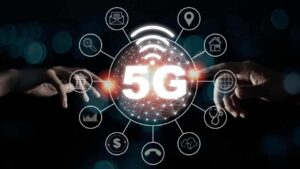The advent of 5G technology is set to revolutionize the way we connect, communicate, and consume digital services. With its promise of faster speeds, lower latency, and greater connectivity, 5G is poised to be a game-changer across industries. From enabling ultra-fast internet for consumers to powering innovations in autonomous vehicles, healthcare, and smart cities, the potential benefits of 5G are vast and transformative.
In this article, we will explore the key benefits of 5G technology and its impact on various sectors. We will also address frequently asked questions (FAQs) to help better understand how 5G will shape the future.
What is 5G?
Before diving into its benefits, let’s first define 5G. 5G, or fifth-generation wireless technology, is the latest iteration of mobile networks that succeeds 4G (LTE). The Benefits of 5G Technology It is designed to offer significantly faster data speeds, reduced latency, and increased capacity compared to previous generations. 5G operates on higher frequency bands, which enable faster data transmission and support a larger number of devices simultaneously.

In addition to offering faster speeds and lower latency, 5G will be a critical enabler for the Internet of Things (IoT), smart cities, and next-generation technologies like augmented reality (AR) and virtual reality (VR).
Key Benefits of 5G Technology
1. Faster Speeds
The most obvious benefit of 5G is the dramatic increase in data speeds. With 5G, users can experience download speeds up to 100 times faster than 4G, reaching up to 10 Gbps (gigabits per second). This leap in speed will allow users to stream high-definition videos, download large files, and participate in video calls without buffering or interruptions.
For instance, downloading a full-length HD movie that would take several minutes on 4G could be done in a matter of seconds on 5G. This will make a significant difference for users who rely on mobile devices for entertainment and work-related tasks, as well as for businesses that require fast and reliable data transfers.
2. Lower Latency
One of the most crucial advancements that 5G brings is its low latency, which refers to the delay in sending and receiving data. With 5G, latency can be reduced to as low as 1 millisecond (ms), compared to 20-30 milliseconds with 4G. Low latency is especially important for real-time applications such as:
- Online gaming: Gamers can experience smoother, lag-free gameplay.
- Remote surgeries: Surgeons can operate robotic surgical tools in real-time with no delays, making telemedicine more effective and safer.
- Autonomous vehicles: Self-driving cars rely on real-time communication between vehicles, infrastructure, and networks. 5G’s low latency enables quick decision-making, improving road safety and traffic management.
3. Greater Connectivity and Capacity
5G is designed to handle the massive increase in connected devices, a critical factor as the world becomes more connected. With billions of IoT devices, such as smart home appliances, wearable devices, and sensors, 5G provides the bandwidth and capacity needed to support them all simultaneously.
This means that 5G networks can accommodate a larger number of devices in a given area, reducing congestion and maintaining high-quality service in densely populated environments like stadiums, city centers, and office buildings.
4. Enhanced Reliability
5G technology is built to offer more reliable connectivity compared to its predecessors. In mission-critical applications like healthcare, emergency services, and industrial automation, a stable and uninterrupted connection is vital. 5G’s enhanced reliability ensures that there are minimal disruptions, making it a trusted choice for businesses and organizations that rely on continuous, real-time communication.
5. Enabling Smart Cities
5G is a crucial enabler for the development of smart cities. By connecting various sensors, cameras, and devices, 5G helps improve city infrastructure and public services. For example:
- Traffic management: 5G can help reduce traffic congestion by enabling smart traffic lights that adjust in real-time based on traffic conditions.
- Energy efficiency: Smart grids powered by 5G can optimize energy distribution, reducing energy consumption and improving sustainability.
- Public safety: Enhanced video surveillance and emergency response systems can operate seamlessly, improving safety for residents.
6. Advancements in Healthcare
The healthcare sector stands to gain significantly from the benefits of 5G. With low latency and high reliability, 5G technology will enable:
- Telemedicine: Doctors can conduct high-definition video consultations with patients in real time, regardless of location.
- Remote surgeries: As mentioned earlier, the low latency of 5G will allow surgeons to perform remote surgeries using robotic tools, increasing access to specialist care in remote areas.
- Wearable health devices: Wearables can transmit health data such as heart rate, blood pressure, and glucose levels in real-time to doctors and hospitals for better monitoring of patient health.
7. Enhanced Virtual and Augmented Reality Experiences
5G is expected to transform the worlds of virtual reality (VR) and augmented reality (AR) by providing fast, reliable connections with minimal lag. This is particularly important for industries like gaming, education, and retail, where immersive experiences are key:
- Gaming: Players will experience more realistic VR gaming experiences with less lag.
- Education: AR-based learning tools will become more interactive, engaging students in real-time learning experiences.
- Retail: Consumers can use AR to try on clothes, view products in 3D, and enjoy immersive shopping experiences from the comfort of their homes.
8. Support for Industrial Automation
5G has the potential to revolutionize industries by enabling industrial automation and smart factories. The ultra-low latency and high reliability of 5G networks will support the use of real-time data for robotics, machinery, and supply chain operations. This could lead to:
- Increased productivity: Factories can use automated systems and AI-powered robots to optimize production.
- Remote monitoring and control: Operators can monitor and control machinery remotely, reducing downtime and increasing efficiency.
Frequently Asked Questions (FAQs) About 5G
Q1: What is the difference between 4G and 5G?
A1: The main difference between 4G and 5G is speed and latency. 5G offers significantly faster data transfer speeds (up to 100 times faster than 4G) and lower latency (1 millisecond versus 20-30 milliseconds in 4G). 5G also supports more devices per square kilometer, making it better suited for IoT and smart city applications.
Q2: Is 5G available everywhere?
A2: As of now, 5G coverage is still being rolled out in many regions. While major cities in developed countries are seeing increasing 5G availability, rural and remote areas may have limited access. The rollout is expected to expand in the coming years as infrastructure improves.
Q3: Will 5G cause health problems?
A3: There has been widespread speculation about the potential health risks of 5G, but according to scientific consensus from health organizations like the World Health Organization (WHO), there is no conclusive evidence that 5G technology poses any significant health risks. 5G frequencies are within the non-ionizing range of the electromagnetic spectrum, which means they do not have enough energy to remove electrons from atoms or molecules.
Q4: How much faster is 5G than 4G?
A4: 5G can be up to 100 times faster than 4G, with download speeds reaching up to 10 Gbps under ideal conditions, compared to 4G’s maximum speed of 1 Gbps. This difference makes 5G ideal for data-heavy tasks like HD video streaming, cloud-based applications, and more.
Q5: How will 5G impact the economy?
A5: 5G is expected to have a significant impact on the global economy. It will enable new business models, industries, and innovations, creating millions of new jobs and boosting productivity across sectors such as manufacturing, healthcare, transportation, and retail. It is also predicted to contribute trillions of dollars to global GDP.
Q6: Will 5G make my current smartphone obsolete?
A6: If your smartphone does not support 5G, it won’t be able to take advantage of the faster speeds and other benefits of the new network. However, most new smartphones coming to market now are 5G-compatible, and prices are expected to drop, making 5G devices more accessible.
Conclusion
The benefits of 5G technology extend far beyond just faster mobile internet speeds. From enabling smart cities to transforming healthcare and enhancing virtual experiences, 5G is poised to revolutionize industries and improve the quality of life for individuals around the globe. While challenges remain in rolling out the technology and ensuring equitable access, the future of 5G promises to unlock new possibilities that were previously unimaginable.



